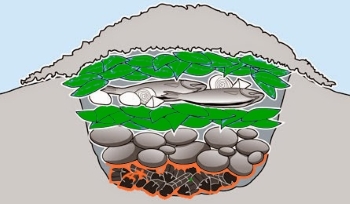
 |

So, in the pre-dawn darkness, the brothers packed all of the mi•nᵊkh•âhꞋ on donkeys, stuffed double the coins in their pockets—and Bin•yâ•minꞋ—and began their donkey caravan, yet again, to Ankh-Tawi to purchase more distribution supplies of grain. Once again, they stood in the line to purchase grain from the Deputy-Par•ohꞋ Tzâ•phᵊn•atꞋ-Pa•nᵊeiꞋakh![]() .
.
When the Deputy-Par•ohꞋ (their eschewed and estranged brother, Yo•seiphꞋ) saw Bin•yâ•minꞋ with them, he instructed his chief aide, "Bring those men to my wing of the Palace for a luncheon. Slaughter generously from the tzon![]() and prepare a banquet. So the chief aide did as Deputy-Par•ohꞋ Tzâ•phᵊn•atꞋ-Pa•nᵊeiꞋakh
and prepare a banquet. So the chief aide did as Deputy-Par•ohꞋ Tzâ•phᵊn•atꞋ-Pa•nᵊeiꞋakh![]() had instructed, and brought the brothers toward Beit Yo•seiphꞋ.
had instructed, and brought the brothers toward Beit Yo•seiphꞋ.
When the brothers saw that they were being brought to the home of the Deputy-Par•ohꞋ of Mi•tzᵊraꞋyim, they became terrified, saying among themselves, "It's about the coins that we found in our sacks. He's bringing us to his headquarters where he can roll over on us, fall on us and take us and our donkeys for slaves."
Then they approached the chief aide who was over the Palace of Deputy-Par•ohꞋ Tzâ•phᵊn•atꞋ-Pa•nᵊeiꞋakh![]() , pleading with him at the gate to the Palace, "It's on me, a•don•iꞋ, one said. "We simply came down the first time to purchase some of the grain distribution." He went on to explain to the chief aide what happened, adding, "We've brought more coins to purchase some more grain. We don't know who put our coins back in our sacks."
, pleading with him at the gate to the Palace, "It's on me, a•don•iꞋ, one said. "We simply came down the first time to purchase some of the grain distribution." He went on to explain to the chief aide what happened, adding, "We've brought more coins to purchase some more grain. We don't know who put our coins back in our sacks."
"Shâ•lomꞋ to you," the chief aide replied. "Don't be terrified. Your ël•oh•imꞋ and the ël•oh•imꞋ of your father, gave you the treasure in your sacks. I received your coins." Then he brought Shi•mᵊōnꞋ out of the jail to them and took all of the brothers to the Palace of Deputy-Par•ohꞋ Tzâ•phᵊn•atꞋ-Pa•nᵊeiꞋakh![]() , giving them water to rinse their feet and fed their donkeys with provender. Meanwhile, the brothers, who were expecting the Deputy-Par•ohꞋ to arrive at noon, carefully arranged the mi•nᵊkh•âhꞋ that they had brought for him, to make the best presentation. They'd been told that they would attend a dinner-banquet
, giving them water to rinse their feet and fed their donkeys with provender. Meanwhile, the brothers, who were expecting the Deputy-Par•ohꞋ to arrive at noon, carefully arranged the mi•nᵊkh•âhꞋ that they had brought for him, to make the best presentation. They'd been told that they would attend a dinner-banquet![]() there.
there.
When the Deputy-Par•ohꞋ came home, the brothers presented him with the mi•nᵊkh•âhꞋ they had brought, bowing before him with their faces down – fulfilling one of his dreams (except for his father, who was not there). So he inquired into their shâ•lomꞋ and asked, "And the shâ•lomꞋ of your aged father whom you mentioned; is he still alive?"
"The shâ•lomꞋ of your worker, our father, is that he's still alive," they replied nodding and bowing.
 |
| ëÌÈîÇø – 1. to stew-roast meat in a subsurface earth-pit containment-oven while coals are hot; or 2. to gently cook fruit in a subsurface earth-pit containment-oven in which coals have cooled to warming temperature. 3. to cast a net as a subsurface containment trapping fish. As a noun, ëÌÒîÆø, an earth-pit oven, cast-net or agent of netting and containing in the subsurface (netherworld) earth-pit oven fires, evolved into the Hebrew term for any non-Tor•âhꞋ cleric. |
Looking around at his brothers, he spotted his little brother, Bin•yâ•minꞋ, the son of his mother,![]() Râ•kheilꞋ. "Is this your youngest brother whom you mentioned?" he asked them, adding "May Ël•oh•imꞋ be gracious to you, Bëni." Without pausing, Yo•seiphꞋ left them, going into another room, because his compassion for his little brother was stewing in him like a ëÌÒîÆø. So he excused himself, went into a private room and cried.
Râ•kheilꞋ. "Is this your youngest brother whom you mentioned?" he asked them, adding "May Ël•oh•imꞋ be gracious to you, Bëni." Without pausing, Yo•seiphꞋ left them, going into another room, because his compassion for his little brother was stewing in him like a ëÌÒîÆø. So he excused himself, went into a private room and cried.
When he had regained his composure, he splashed water on his face and returned. Keeping his composure, he instructed, "Serve the lëkhꞋëm."
First, the waiters served the Deputy-Par•ohꞋ, seated alone at the head table. Then they seated the brothers at their own separate table. Finally, they seated the Egyptians who were attending the dinner at their own separate table (because it would be a to•eiv•âhꞋ for the Egyptians to eat with Hebrews – who were eating their sacred, holy cows). The brothers marveled how the waiters discerned to seat them in chronological order of their ages: from senior, the brother born first, to junior, the youngest brother.
When the Deputy-Par•ohꞋ had been amply served all that he would want, then remaining portions were distributed to the other dinner guests – and they served five times as much to Bin•yâ•minꞋ as to any of the others.

Optional parental preparation:
åÌèÀáÉçÇ èÆáÇç – a doublet, which connotes an amplification of the verb; in the case of this verb in its context: slaughter generously, slaughter for a generous banquet![]()
Lit. "they would eat bread." To Hebrews, bread with a meal implied hand-washing (concluded by a bᵊrâkh•âhꞋ) followed by the bᵊrâkh•âhꞋ over bread, signaling a full dinner banquet (usually including meat and wine) in contrast to a light repast or snack.![]()
How does an earth-pit oven work?
Questions you might anticipate that your child might raise and be prepared to discuss:
![]()
 |
 |